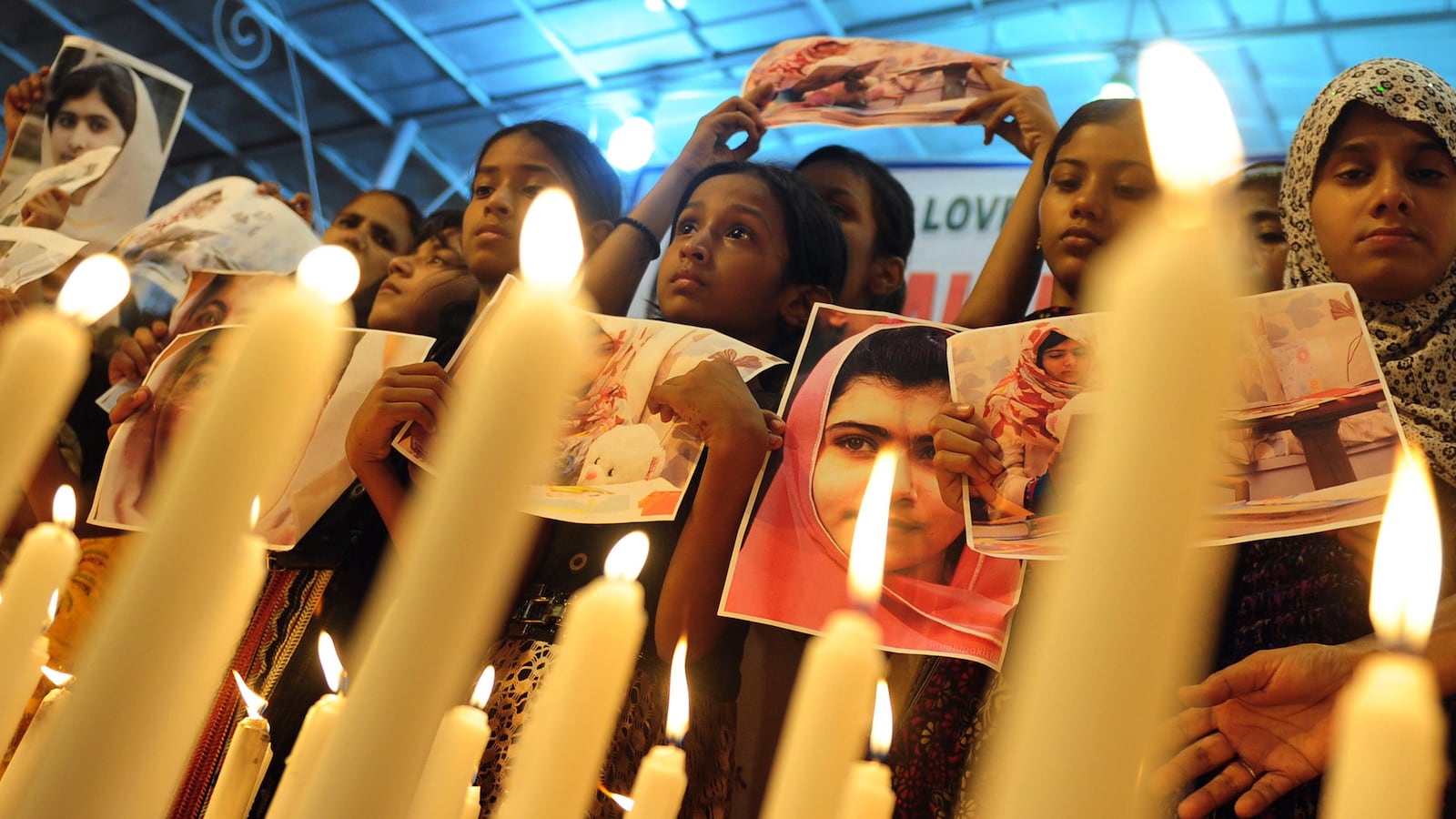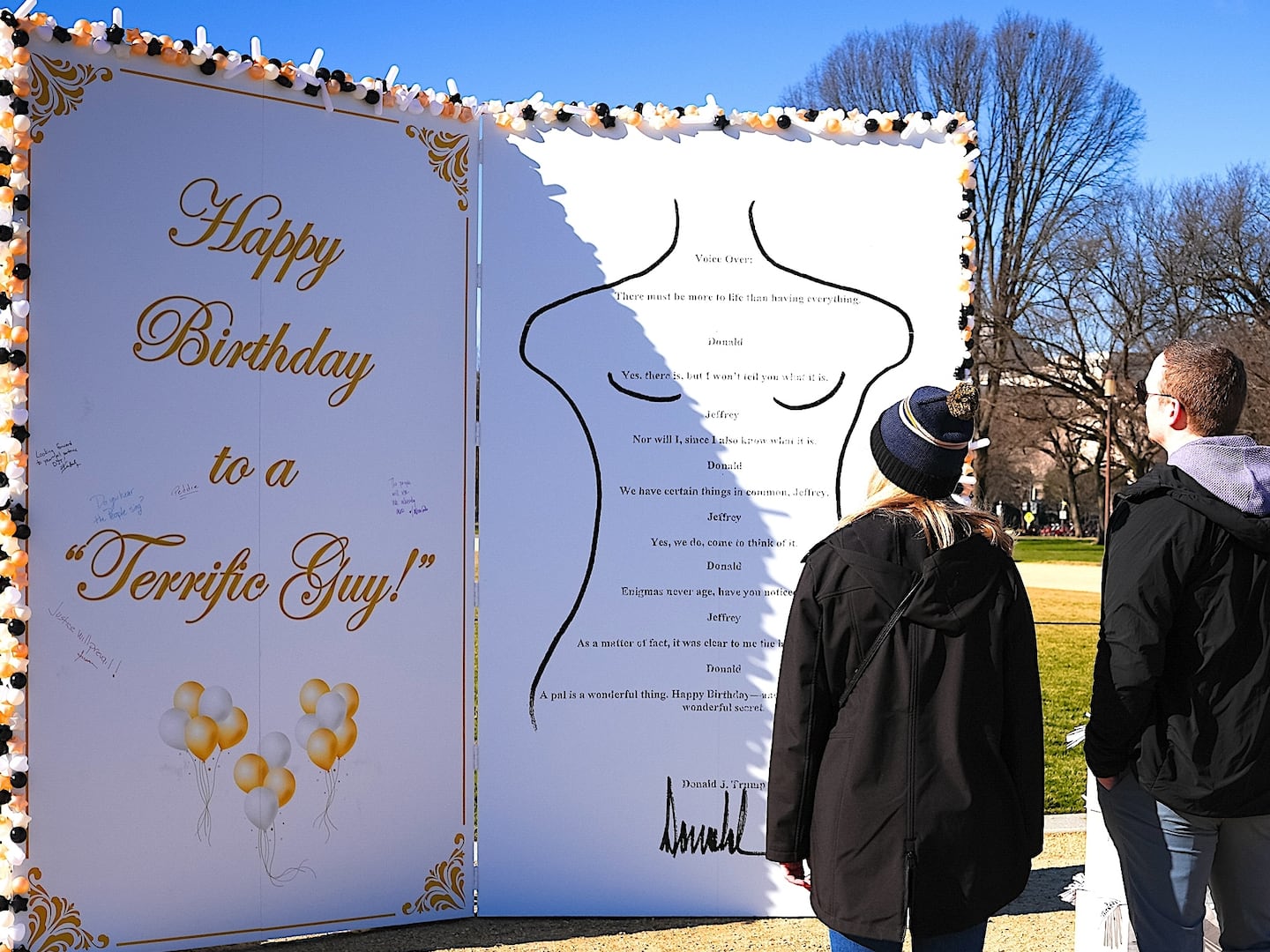
The world’s newest icon of courage is only 15 years old. She is facing multiple operations from her hospital bed in Birmingham, Britain, and she is still too sick to be able to speak to her supporters.
But this week, one month after Malala Yousafzai was shot by the Taliban in the Swat Valley of Pakistan, country after country is adopting her name as their symbol for a girl’s right to education.
This week, as Malala Day is celebrated with grassroots events in 100 nations, a campaign has been launched to offer her the Nobel Peace Prize. As long as there are girls out of school anywhere in the world, Malala will be their beacon of hope.
Earlier today, I was able to speak with Malala’s two friends injured in the October attack and pass on my best wishes. Kainat is a courageous young woman who has been able to return to school and wants to be a doctor. Shazia, the other brave young woman, informed me she is getting better, most enjoys biology class, and wants to be a doctor. I was also delighted to hear about Pakistan’s creation of four Malala schools, a Malala Post-Graduate Institute and a new Malala Center for Women’s Studies.
Visiting Pakistan and everywhere I go, the message is the same: we are all with Malala. One million people from across the world have signed petitions run on IamMalala.org and Avaaz.org, in honor of Malala.
Upon my arrival in Pakistan, I was greeted by Baela Jamil’s presentation of 1 million additional Pakistani signatures calling for the right to education on behalf of a very active Pakistani civil society.
We therefore have over two million people in total calling for every child to be in school on Malala Day. Their ambition continues as Pakistani civil society will soon add an additional one million signatures from out-of-school children demanding their right to an education through the One Million Signature Campaign to demand free and compulsory education. They are well on their way with over 100,000 signatures to date.
Yesterday when I presented the petitions to the president of Pakistan, in front of a cheering audience of 500 education for all supporters, I quickly realized that the campaign for putting education as the first priority for every child, now engaging young girls and boys themselves, is an unstoppable movement which will go on and on until every child is at school.
What has happened in Pakistan can happen in the rest of the world. In Nigeria, where 10 million children are out of school; in Afghanistan, where the figure is 4.5 million; and in India where there are more than 2 million children without a classroom to learn in.
The way forward is to agree with every country that has not yet met the Millennium Development Goals with deadlines for delivery to make sure we do everything we can to ensure all children have the opportunity to go to school by 2015. We should ask every country to join the Accelerated Millennium Development Goal Framework process. This allows countries to assess current education plans, strategies, and bottlenecks in consultation with international organizations and then work together with the international community to achieve their goal of education on an accelerated timeline.
Time is short. If we are to meet the 2015 deadline of delivering the right to primary education we should set an ambitious timetable. In April 2013, the United Nations Secretary-General Ban Ki-Moon, World Bank President Jim Kim, and myself, alongside the heads of major international agencies such as UNESCO, UNICEF, UNDP, UNFPA, and the Global Partnership for Education, will meet with international leaders in Washington, in particular ministers of education and finance. Our aim will be to harness international and domestic support for realizing the 2015 goal.
Prior to the April meetings, we will engage with governments, civil-society authorities and foundations, and international organizations to encourage countries who have fallen off track to develop a detailed, budgeted plan enabling them to deliver quality education for every girl and boy with teachers, books, and classrooms by 2015. Any plans should be drawn up in conjunction with all educational organizations from civil society interested in achieving the universal goal—and taking stock of the existing work that has gone into current plans that are in place.
I am pleased that the president of Pakistan, minister of education, and the minister of education from Malala’s province will travel to Paris to meet donors on Dec. 10 at UNESCO as a next step in this process of mobilizing international and domestic support for education in Pakistan.
Across Pakistan and the world, young people have been celebrating Malala Day. They know that Malala’s dreams represent what is best about our world.
Thirty-two million girls should not be denied their right to schooling any longer. Children who are barred from school anywhere across the globe should be provided quality learning opportunities as quickly as possible.
I have said that the international community will be inspired to mobilize additional support when countries make a domestic commitment to put education first. With 61 million children still not going to school, can we work together to build the schools, train the teachers, provide the learning materials, and ensure that there is no discrimination against any child who wants to go to school? I believe we can.
Join the petition for universal education on www.educationenvoy.org.






